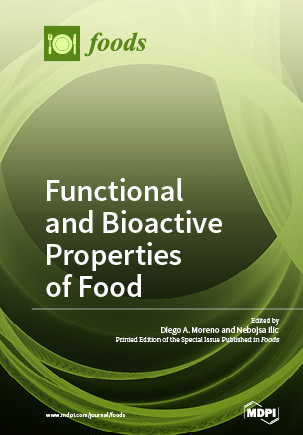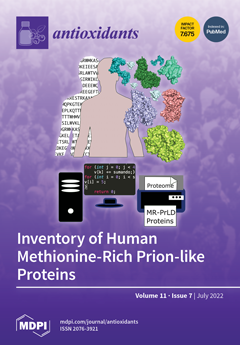Bee Bread
How to submit an article:
- Registered users can submit any published journal article that has a unique DOI (Digital Object Identifier) name or link to Research Hub.
- For example, you can paste the full DOI link:
https://doi.org/10.1109/5.771073or just the DOI name:10.1109/5.771073into the field above and click submit. - The person who is first to submit a valid article to Research Hub will forever be credited for it, and every article submission earns you +6 Research Points.
Related Topics
Published research studies are articles that present the findings of original research that has undergone a peer-review process and has been made publicly available in scholarly journals, books or other media.

Antiviral Activity of Beebread, Bee-Collected Pollen and Artificially Fermented Pollen against Influenza A Virus
2023 May 13 Foods Dimitriou T, Asoutis Didaras N, Barda C, Skopeliti D, Kontogianni K, Karatasou K, et al.
Experimental Study Influenza Antiviral Bee Pollen Honey Bee BreadBee-collected pollen and bee bread, particularly when artificially fermented, demonstrate significant antiviral activity against the H1N1 strain of the influenza A virus.

Review on Bee Products as Potential Protective and Therapeutic Agents in Male Reproductive Impairment
2021 Jun 05 Molecules Suleiman JB, Bakar ABA, Mohamed M
Bee products such as honey, royal jelly, bee pollen, bee brood, apilarnil, bee bread, bee wax, and bee venom showed positive effects on male reproductive parameters, suggesting their potential as preventive and therapeutic treatments for male sub/infertility.
Review Article Bee Pollen
Bee Collected Pollen and Bee Bread: Bioactive Constituents and Health Benefits
2019 Nov 20 Antioxidants Mărgăoan R, Stranț M, Varadi A, Topal E, Yücel B, Cornea-Cipcigan M, et al.
Bee pollen and bee bread have been shown to possess nutritional and health protective properties, including antioxidant, anti-inflammatory, anticancerogenic, and immunostimulatory effects, making them potential candidates for use as functional foods and future medicines.
Review ArticleResearch insights are moderated by the Research Hub team and offer an at-a-glance overview of interesting research findings.

2023 Foods
Bee-collected pollen and bee bread, particularly when artificially fermented, demonstrate significant antiviral activity against the H1N1 strain of the influenza A virus.
Experimental Study Antiviral Bee Pollen Honey Influenza
Antiviral Activity of Beebread, Bee-Collected Pollen and Artificially Fermented Pollen against Influenza A Virus
Dimitriou T, Asoutis Didaras N, Barda C, Skopeliti D, Kontogianni K, Karatasou K, et al.
Review Articles
Review articles summarise and critically evaluate the current state of research on a specific topic or field by synthesising multiple primary research studies.

Review on Bee Products as Potential Protective and Therapeutic Agents in Male Reproductive Impairment
2021 Jun 05 Molecules Suleiman JB, Bakar ABA, Mohamed M
Bee products such as honey, royal jelly, bee pollen, bee brood, apilarnil, bee bread, bee wax, and bee venom showed positive effects on male reproductive parameters, suggesting their potential as preventive and therapeutic treatments for male sub/infertility.
Review Article Bee Pollen
Bee Collected Pollen and Bee Bread: Bioactive Constituents and Health Benefits
2019 Nov 20 Antioxidants Mărgăoan R, Stranț M, Varadi A, Topal E, Yücel B, Cornea-Cipcigan M, et al.
Bee pollen and bee bread have been shown to possess nutritional and health protective properties, including antioxidant, anti-inflammatory, anticancerogenic, and immunostimulatory effects, making them potential candidates for use as functional foods and future medicines.
Review ArticleClinical Trials
Clinical trials are research studies that involve people and are conducted to evaluate the safety and efficacy of new treatments or interventions, such as drugs, medical devices, or behavioural therapies.
Study Protocols
Published study protocols are detailed plans that outline the objectives, methodology, statistical analyses, and organisation of a research study that have been made publicly available for others to review and use as a reference.
Presentation Slides

Experimental Study
Bee-collected pollen and bee bread, particularly when artificially fermented, demonstrate significant antiviral activity against the H1N1 strain of the influenza A virus.
Dimitriou T, Asoutis Didaras N, Barda C, Skopeliti D, Kontogianni K, Karatasou K, Skaltsa H, Mossialos D
Executive Summary
Write an executive summary in the form of a blog article on the topic of "Research into Chinese medicine treatment for Bee Bread" summarising the research below and using language that can be easily understood by patients and avoiding medical jargon using a professional and caring tone of voice.
Write an executive summary in the form of a blog article on the topic of "Researched Chinese medicine treatments for Bee Bread" summarising the research below in an objective and easy to understand way, and using language that can be easily understood by patients. Group the article into Chinese medicine treatments first, followed by nutrition and other treatments. Avoid using medical jargon and use a professional and caring tone of voice.
Write me a concise but easy to understand executive summary on the topic of "Chinese medicine treatments for Bee Bread" based on the following research that I will give you. Your summary should be 2 paragraphs long in Australian English spelling and include references to the studies.
A Experimental Study published in 2023 in the journal Foods found that Bee-collected pollen and bee bread, particularly when artificially fermented, demonstrate significant antiviral activity against the H1N1 strain of the influenza A virus. The research investigated the antiviral properties of bee-collected pollen (BCP) and bee bread (BB), including versions that had undergone artificial fermentation. The experiment also assessed separate proteins, water content, and -butanol portions of these substances. The analysis evaluated their effectiveness against the H1N1 strain of the influenza A virus (IAV). The antiviral behavior of these materials was taken in lab conditions via a comparative real-time PCR analysis working on their inhibitory concentration and selectivity index. The outcomes revealed artificial fermentation improved the antiviral effectiveness of BCP. The protein fractions within the BCP and BB presented the greatest antiviral activity. Observations also highlighted that the chemical composition, prominent in proteins, and potentially microbiome metabolism determined the antiviral properties of BCP and BB. The chemical profile analysis emphasized the existence of some specialized metabolites that might be contributing towards this antiviral action.
Moderation Tools
Topic
Sign In
Users not signed in are limited to viewing the 5 most recent items of content.